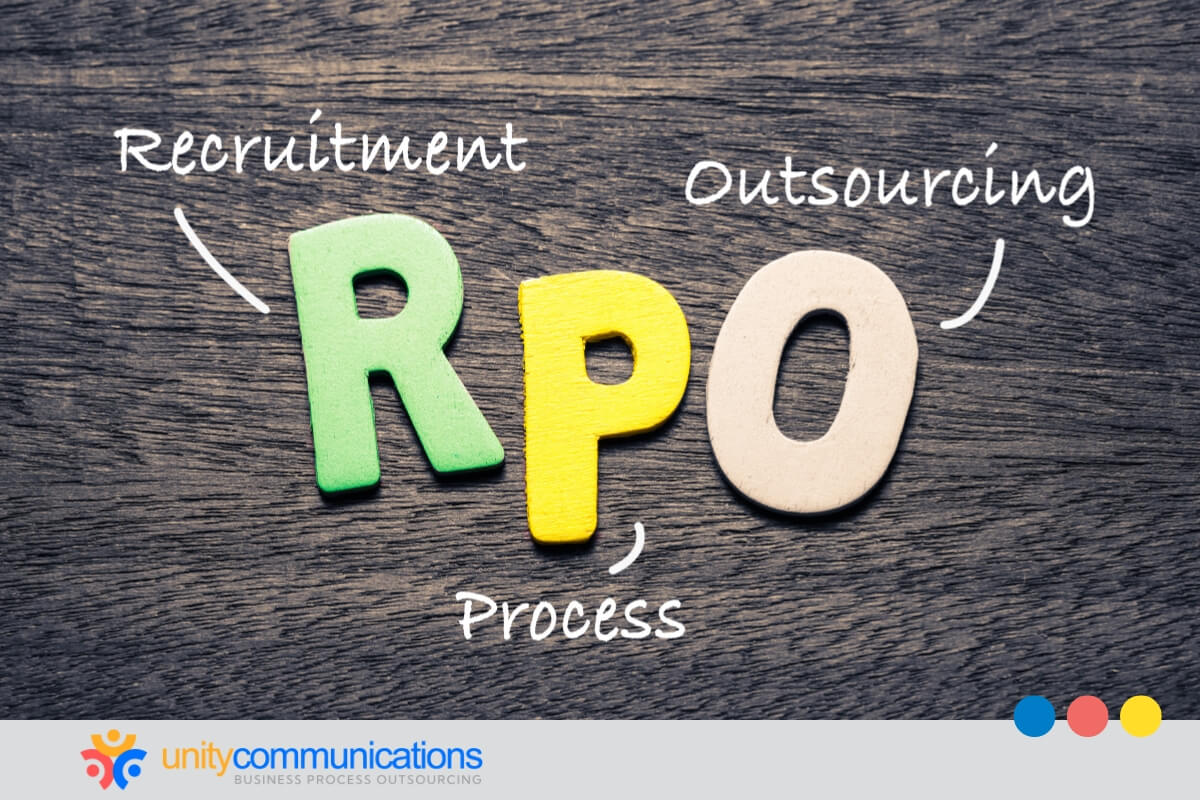Table of Contents
With the rise of remote work, executives rely on business process outsourcing (BPO) for recruitment and staffing administration. However, while this practice shatters geographic boundaries, it also presents complexities.
How do you recruit, evaluate, and onboard global remote professionals without losing time, money, or cultural cohesion? Delegating recruitment tasks or recruitment process outsourcing (RPO) directly solves these challenges.
If you want to learn more about RPO, this article is for you. In this guide, you’ll learn about the nature and role of RPO and explore the many benefits that drive remote hiring success.
What is recruitment process outsourcing?

Recruitment process outsourcing (RPO) is a specialized BPO focused on talent acquisition. It enables companies to delegate some or all aspects of their recruiting process to an external expert.
But what does this mean in practice, especially in the remote-first world? To better understand this, it’s best to first answer the question: What is BPO? Business process outsourcing involves delegating non-core tasks to a third-party provider that extends to your internal team.
It’s become a widespread practice across businesses of all sizes and industries. According to Statista, the global BPO market could reach almost $415 billion in 2025. That’s because it helps streamline operations, reduce overhead, and allow businesses to focus on what they do best.
RPO builds on this by applying the same principle to recruitment. Thus, many businesses outsource recruitment. According to Deloitte’s 2023 Global Shared Services and Outsourcing Survey, 57% outsource recruitment tasks and staffing administration.
Five ways RPO accelerates remote hiring success
RPO providers don’t just fill jobs; they become deeply integrated with your HR function. They develop customized hiring frameworks aligned with your company culture, goals, and workforce needs.
RPO partners offer scalable, flexible solutions by combining global reach with local insights. This helps businesses adapt to fluctuating hiring demands and evolving business priorities.
1. Global talent sourcing
Remote work inherently breaks down geographical barriers. To truly leverage this advantage, you need a partner capable of tapping into international talent markets.
Local talent pools don’t limit RPO providers. They can actively search for candidates across the globe and build a virtual team through the following:
- Robust infrastructure: global ATS, communication and collaboration tools, and secure data management
- Extensive networks: international job boards and platforms, partnerships with local agencies and organizations, and global talent databases
- Specialized expertise: cross-cultural communication skills, international labor law and compliance knowledge, and global sourcing strategies
- Remotely friendly processes: time zone management protocols, culturally sensitive communication guidelines, and virtual onboarding processes
Partnering with an RPO provider opens a significantly larger pool of potential employees, ensuring remote hiring success. You gain access to diverse skills and experience that might not be available within your immediate location.
2. Flexible hiring models
Remote hiring needs can change rapidly. You might need to quickly onboard many remote customer support agents or strategically hire a few highly specialized engineers online.
RPO providers can adjust their resources and processes to meet these varying demands. Unlike traditional recruitment methods that might be more rigid, RPO offers adaptable models you can scale based on your specific needs and timelines.
This flexibility is particularly valuable in the often-fluctuating landscape of business and remote team growth. It also prevents over-hiring or being caught short-staffed, which can harm productivity and costs.
3. Digital recruitment tools
In a remote-first world, virtual interviews replace physical interactions. RPO providers are adept at using video conferencing and other digital communication tools to assess candidates effectively, regardless of their location.
The use of artificial intelligence (AI) in the BPO industry is not a new practice. A recent research reveals that 60% of businesses that outsource are leveraging AI-powered BPO, while 57% are considering building partnerships.
The RPO sector is no exception. AI-powered screening can quickly sift through a large volume of applications. This allows them to identify the most qualified remote candidates while saving significant time and effort.
- Virtual interviewing platforms thoroughly and consistently evaluate candidates regardless of their location. They can help mimic in-person interview elements, such as screen sharing for technical assessments or virtual “meet the team” sessions.
- ATS provides a single source of truth for all candidate information and communication. It is crucial for coordinating a distributed remote hiring team and ensuring a consistent experience for remote applicants.
- AI-powered chatbots and candidate engagement platforms enhance the candidate experience by providing instant support and information. They make remote applicants feel more connected and informed, even without in-person interaction.
- Online assessment and skill-testing tools can objectively evaluate the necessary skills for remote work (self-discipline, communication, technical proficiency) without relying solely on subjective interview impressions, leading to better-quality remote hires.
- Video assessment tools provide a richer understanding of a remote candidate’s soft skills and communication abilities beyond written applications, which is vital for effective remote teamwork.
Digital recruitment tools have revolutionized how RPO providers find and assess remote talent. From AI-powered screening to virtual interviews, these technologies enable more efficient, consistent, and effective hiring regardless of geographic boundaries.
4. Consistency in process and employer branding
Consistent messaging and a well-defined employer brand help build trust and create a strong sense of belonging, even before they’re hired. This is essential for attracting and retaining top talent.
That’s because remote candidates might be unable to visit your physical office. Their interaction with the recruitment process is their primary company touchpoint.
RPO providers have the expertise to tailor your employer branding to resonate with local nuances while maintaining core company values for remote hiring success.
- Craft job descriptions that accurately reflect your employer brand while using language and terminology that is easily understood and appealing to local talent markets.
- Implement consistent communication protocols that reflect your company’s tone and voice, ensuring a unified experience for all remote candidates.
- Design and implement interview processes that consistently assess candidates against your company’s values and role requirements for a fair and equitable experience for everyone.
- Tailor your core employee value proposition (EVP) to highlight benefits and opportunities that are particularly attractive to remote workers in specific regions, such as flexibility or work-life balance.
Consistent employer branding becomes the foundation of trust for remote candidates who never set foot in your office. RPO providers expertly balance global brand consistency with local market appeal, creating authentic connections that attract and retain top remote talent.
5. End-to-end recruiting process management
Managing a remote hiring process across multiple time zones and potentially different legal frameworks can be complex. RPO providers take ownership of the entire recruitment lifecycle, from initial sourcing and candidate engagement to interviews, offer negotiation, and onboarding. They enhance efficiency and transparency throughout the whole remote recruitment journey with the following:
- Process discipline
- Established workflows
- Measurable key performance indicators (KPIs)
This reduces the administrative burden on your team and facilitates a smoother experience for hiring managers and candidates.
By managing the entire process, RPO teams can identify bottlenecks and areas for improvement in their remote hiring strategy, ensuring success. The data-driven insights they provide allow for continuous optimization, leading to:
- Reduced time-to-hire
- Lower cost-per-hire
- Improved quality of remote hires
This focus on measurable results and continuous improvement is a significant advantage over more transactional recruitment methods. For instance, an RPO can track the average time it takes to hire a remote software engineer in Eastern Europe and identify areas in the process that it can streamline.
Unlike traditional staffing agencies that prioritize volume, RPO providers offer long-term strategic value. They bring a deep understanding of talent markets, compliance, and digital tools, making them ideal allies for remote hiring success.
Five key benefits of RPO for remote teams

Leveraging RPO offers significant advantages for your remote hiring efforts. Consider the practical advantages that enhance your talent acquisition process and build successful remote teams.
1. Efficiency and effectiveness
RPO teams significantly streamline the remote hiring lifecycle with established workflows, refined processes, and automation. This drastically improves the following:
- Time-to-hire
- Internal team effort
- Overall resource investment
- Effectiveness of the remote talent recruitment process
The ultimate result is the acquisition of better-qualified hires at a faster pace.
2. Significant cost savings
Partnering with an RPO for remote hiring translates into substantial successes in cost efficiencies in several key areas.
Offloading the complexities of recruitment reduces the burden on your internal HR department, freeing them to focus on strategic initiatives. Their expertise in candidate assessment also minimizes the risk of costly bad hires.
Additionally, their efficiency in filling roles quickly avoids the productivity losses associated with prolonged vacancies. A tailored RPO solution ensures you only pay for the recruitment services you genuinely need, optimizing your investment in talent acquisition.
3. Improved candidate experience
In today’s competitive talent market, candidate experience can make or break hiring outcomes, particularly for remote roles. RPO teams can create a candidate-centric journey that is smooth, respectful, and communicative at every stage.
This focus on the candidate enhances your employer brand reputation in the global remote talent pool. It also plays a crucial role in attracting and ultimately retaining top-tier talent who value professionalism and a positive interaction throughout their hiring process.
4. Data-driven decisions
Leading RPO providers emphasize utilizing data analytics to inform and optimize remote hiring strategies. They meticulously track key metrics for the following:
- Effectiveness of different global sourcing channels
- Candidate conversion rates
- Time to fill
- Cost per hire
- Quality of hire
- Candidate satisfaction
- Hiring manager satisfaction
- Offer acceptance rate
- Source of hire
- Diversity metrics
- Application completion rate
- Referral rate
- First-year attrition rate
- Time to offer
By analyzing the data, RPO teams can provide valuable insights for remote hiring success. The information can contribute to continuous improvement at each step of the remote recruitment process and inform decisions affecting talent acquisition strategy.
5. Access to specialized expertise
RPO providers offer access to a network of recruiters who possess specialized knowledge. That includes domain-specific intelligence and a deep understanding of various industries and geographical talent markets.
For example, they can build specialized engineering teams with specific technical skill sets in Poland. They also excel at establishing multilingual customer support hubs in the Philippines, considering the local language and culture.
Why remote hiring requires a strategic approach

The traditional recruiting process was built for on-site roles. However, remote hiring introduces new challenges: assessing candidates virtually, ensuring cultural alignment from a distance, maintaining engagement, and onboarding across geographies. An effective remote recruitment strategy must:
- Use digital tools and virtual platforms. Remote hiring depends on tools like applicant tracking systems (ATS), AI-based screening, and video interview platforms for seamless communication across time zones.
- Invest in strong employer branding. Strong employer branding builds trust and visibility in a crowded global talent marketplace. It communicates your values, culture, and commitment to flexibility, which helps attract and retain high-quality remote candidates.
- Ensure a smooth candidate experience. A frictionless, engaging experience improves conversion rates and reduces drop-offs. Candidates who can easily navigate interviews, assessments, and communications are more likely to accept offers and speak positively about your brand.
- Stay compliant with local hiring laws. Each country has its own labor and hiring laws. Staying compliant protects your organization from legal issues and shows respect and professionalism to your international talent.
- Make data-driven hiring decisions. Hiring remotely can generate a high volume of candidates. Data analytics help track performance, refine sourcing strategies, and make evidence-based decisions that reduce bias and improve outcomes.
Remote hiring is a fundamentally different discipline requiring new tools, strategies, and expertise. This complexity makes RPO partnerships beneficial and essential for organizations serious about building world-class remote teams.
The bottom line
Remote work is here to stay, and RPO is the partner strategy you need to thrive in this new normal. When RPO is executed well in remote hiring strategies, it doesn’t just fill roles. It builds the foundation for long-term growth, success, and resilience.
Investing in the right RPO partner lets you streamline recruitment processes, improve your talent acquisition strategy, and enhance candidate experience. Overall, it gives you a competitive advantage while allowing you to cut costs.
Are you considering an RPO for your business? Let’s connect and find the best solution that meets your goals and needs.




